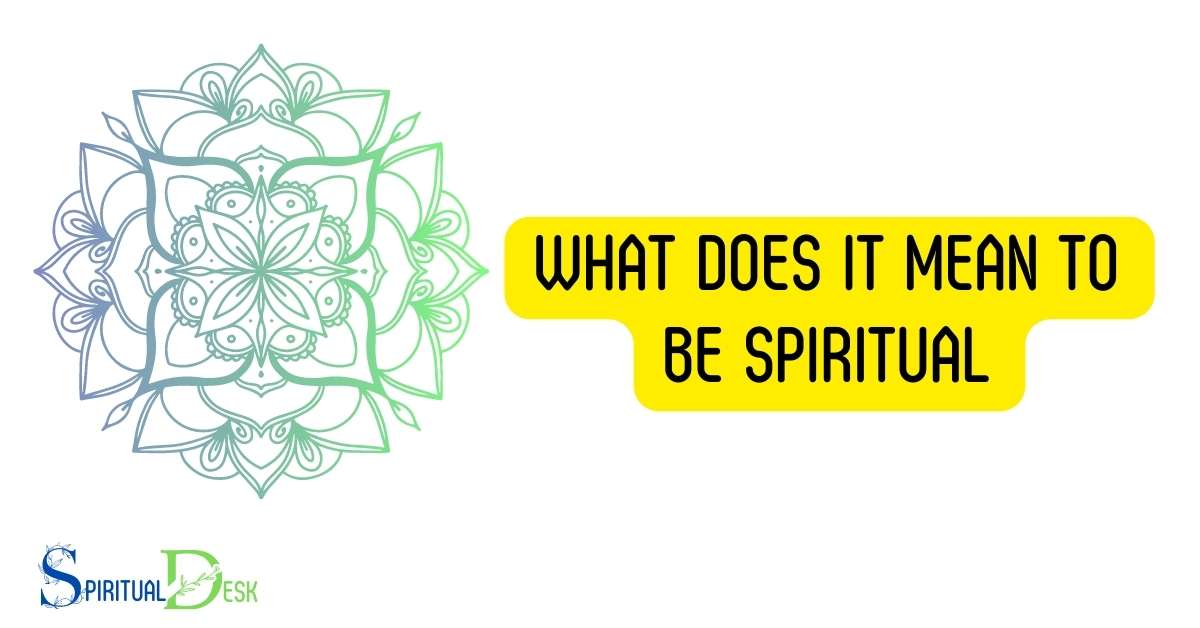What Does It Mean To Be Spiritual? Inner Peace!
Being spiritual refers to a person’s connection to things bigger than themselves, seeking answers to life’s profound questions, and fulfilling a sense of purpose.
It is often related to personal growth, inner peace, and a deep understanding of the self and the world.
Spirituality is a broad concept that varies among different cultures and religions. It encompasses a wide range of beliefs and practices aimed at personal transformation.
Being spiritual often involves seeking meaning in life, developing a strong sense of morality, fostering deep relationships, and expressing compassion towards others. It’s not necessarily tied to any specific religion and can be a personal practice.
Spirituality is subjective, personal, and unique to each individual. It’s about finding your truth, discovering the purpose of life, and being in harmony with oneself and the world. It’s a journey of self-discovery, self-improvement, and a tool for achieving inner peace and fulfillment.
8 Aspects: Meaning To Be Spiritual
| Aspects | Explanation |
|---|---|
| Belief in a Higher Power | Many spiritual people believe in some form of a higher power or divine entity, though not necessarily a traditional deity. |
| Connection to the Universe | To be spiritual often means feeling a deep sense of interconnection with all living beings and the universe. |
| Personal Growth | Spirituality often involves a focus on personal growth and understanding oneself. |
| Inner Peace | Many spiritual people seek inner peace, often through practices such as meditation or mindfulness. |
| Pursuit of Wisdom | Some spiritual people are dedicated to the pursuit of wisdom, whether through philosophical inquiry, religious texts, or other means. |
| Compassion for Others | A sense of compassion and empathy for others is often a key aspect of spirituality. |
| Living in the Present | Many spiritual practices emphasize the importance of living in the present moment, rather than being preoccupied with the past or future. |
| Acceptance | Spirituality often involves a degree of acceptance, both of oneself and of life’s challenges and uncertainties. |
Key Takeaway

Five Facts About: What Does It Mean To Be Spiritual?
Exploring The Meaning And Essence
Spirituality: A Dive Into The Soul
What does it truly mean to be spiritual? It’s a question that has puzzled and intrigued humanity for centuries.
Spirituality is a deeply personal and subjective experience, often linked to a sense of purpose and connection to something greater than ourselves.
In this section, we will explore the meaning and essence of spirituality, delving into its various aspects and shedding light on its significance in our lives.
Embracing A Deeper Connection
Spirituality is about forging a profound connection with oneself, others, and the universe. It goes beyond religious beliefs and practices, encompassing a sense of interconnectedness with all beings and elements of existence.
Here are some key points to consider:
- Developing self-awareness: Spirituality invites individuals to embark on a journey of self-discovery and introspection. Through practices like meditation, mindfulness, or introspective writing, one can cultivate a deeper understanding of their thoughts, emotions, and beliefs.
- Cultivating empathy: A spiritual person strives to view the world through others’ eyes, developing compassion and understanding for those around them. This empathy extends not only to fellow humans but also to animals, nature, and the environment.
- Connecting with nature: Many spiritual practices emphasize the importance of connecting with the natural world. Spending time in nature, appreciating its beauty, and recognizing its sacredness can foster a sense of awe and wonder, inspiring a deeper spiritual connection.
- Seeking meaning and purpose: Spirituality often involves contemplating the bigger questions in life, such as the purpose of existence, the nature of reality, and the meaning behind our actions. Finding a sense of purpose can bring a profound sense of fulfillment and direction.
Spirituality: A Path Of Inner Growth
Spirituality is also a journey of personal growth and transformation. It offers opportunities for self-improvement and the development of virtues.
Here are some aspects to consider:
- Cultivating gratitude: Practicing gratitude helps individuals focus on the positive aspects of life and appreciate the abundance that surrounds them. Gratitude can foster contentment, resilience, and a greater sense of overall well-being.
- Nurturing compassion: Spiritual individuals often strive to cultivate compassion and kindness towards others. This includes acts of generosity, forgiveness, and empathy, promoting harmonious relationships and contributing to a more compassionate world.
- Cultivating mindfulness: Mindfulness is the practice of being fully present in the current moment, without judgment. It enhances self-awareness, reduces stress, and fosters a deeper connection with ourselves and the world around us.
- Fostering self-love and acceptance: Spirituality encourages individuals to embrace and accept themselves fully, including their flaws and imperfections. Practicing self-love and acceptance can lead to greater self-esteem, self-confidence, and overall well-being.
Spirituality is a personal and multifaceted journey, encompassing various aspects of our lives. It promotes self-discovery, connection, personal growth, and the cultivation of virtues.
By embracing spirituality, individuals can find solace, purpose, and a deeper sense of fulfillment in an ever-changing world.
Connecting With The Higher Self
Engaging with spirituality involves a journey of self-discovery and connecting with our higher selves. This connection transcends the physical realm and taps into the essence of who we are at our core.
When we nurture this connection, we open the doors to a greater understanding of ourselves and the universe.
Let’s explore how we can connect with our higher selves and embrace the spiritual journey.
Nurturing The Inner Light
- Meditation: Taking time out of our busy lives to sit in stillness and silence allows us to quiet our minds and create space for our higher selves to emerge. By focusing on our breath or a mantra, we can reach a state of deep relaxation and tap into our inner light.
- Mindfulness: Being present in the moment and fully engaged in our surroundings enables us to connect with our higher selves. When we practice mindfulness, we cultivate a deeper sense of awareness and appreciation for the beauty of life.
- Self-reflection: Setting aside time for self-reflection helps us gain insight into our thoughts, emotions, and behaviors. By delving into our inner world, we become more in tune with our higher selves and can make conscious choices aligned with our true essence.
- Creativity: Engaging in creative endeavors, such as painting, writing, or dancing, allows us to tap into our innate creativity and express our true selves. When we create from a place of authenticity, we facilitate a deeper connection with our higher selves.
- Nature connection: Spending time in nature can be a powerful way to connect with our higher selves. The tranquility and beauty of natural surroundings evoke a sense of awe and wonder that transcends the mundane and opens us up to our spiritual essence.
- Gratitude: Practicing gratitude shifts our focus from what is lacking in our lives to what is abundant. When we express gratitude, we align ourselves with the positive aspects of life and connect with the energy of our higher selves.
Discovering The Divine Within
- Intuition: Honoring our intuition allows us to tap into our divine guidance system. By listening to our inner voice, we can navigate life with greater clarity and trust in the wisdom of our higher selves.
- Self-compassion: Cultivating self-compassion involves treating ourselves with love, kindness, and understanding. When we embrace our imperfections and offer ourselves grace, we open ourselves up to the divine love that resides within us.
- Service: Engaging in acts of service connects us to something greater than ourselves and nourishes our souls. When we selflessly give to others, we align ourselves with the divine nature within us and experience a sense of purpose and fulfillment.
- Synchronicities: Paying attention to synchronicities, meaningful coincidences that seem to be orchestrated by the universe, can provide profound insights and validation of our connection to the divine. By embracing these synchronicities, we open ourselves up to the guidance and support of our higher selves.
- Sacred rituals: Engaging in sacred rituals, such as meditation, prayer, or journaling, can create a sacred space for us to commune with our higher selves and the divine. These rituals help us establish a connection and maintain a sense of spiritual alignment in our daily lives.
Connecting with our higher selves is a transformative journey that deepens our understanding of ourselves and the universe. By nurturing our inner light and discovering the divine within, we can embrace spirituality and embark on a path of self-discovery and fulfillment.
Perspectives And Approaches To Spirituality
What Does It Mean To Be Spiritual?
When it comes to exploring the depths of spirituality, one finds that it encompasses a wide range of perspectives and approaches.
Whether you lean towards eastern philosophies or resonate more with western ideologies, the essence of mindfulness and meditation plays a crucial role in enriching one’s spiritual journey.
Let’s delve into these perspectives and approaches further, understanding the key points behind each.
Eastern Vs. Western Philosophies
Eastern philosophies:
- Rooted in ancient wisdom and teachings from cultures such as hinduism, buddhism, and taoism.
- Emphasizes the concept of interconnectedness and the belief in a universal energy or consciousness.
- Practices such as yoga, meditation, and qigong are commonly used to attain spiritual enlightenment.
- Seeks to transcend the ego and connect with the greater whole.
Western philosophies:
- Influenced by various religious and philosophical traditions, including christianity, judaism, and existentialism.
- Focuses on the individual’s relationship with god or a higher power.
- Encourages prayer, introspection, and gratitude as means of spiritual growth.
- Places importance on morality, ethics, and the pursuit of a meaningful life.
The Essence Of Mindfulness And Meditation
Mindfulness:
- Involves being fully present in the moment, without judgment or attachment to thoughts and emotions.
- Cultivates a sense of awareness and gratitude for the present moment.
- Promotes acceptance and non-reactivity, leading to a calmer and more peaceful state of mind.
- Can be practiced through meditation, breathing exercises, or engaging in daily activities with mindful awareness.
Meditation:
- Refers to a variety of practices that aim to quiet the mind and achieve a state of deep relaxation.
- Helps in reducing stress, enhancing clarity, and developing self-awareness.
- Methods include focused attention, loving-kindness, transcendental, and mindfulness meditation.
- Provides a pathway to tap into inner wisdom, connect with the divine, and experience a sense of oneness.
By understanding the varying perspectives and approaches to spirituality, one can embark on a journey of self-discovery, personal growth, and connection to something greater than oneself.
Whether you choose to explore eastern or western philosophies, or embrace mindfulness and meditation practices, the path to spirituality is as unique as the individual treading it.
So, embrace your curiosity, open your heart, and allow the essence of spirituality to guide you towards a more fulfilling and purposeful life.
The Importance Of Spiritual Practices
Spirituality encompasses a wide range of practices and beliefs that help individuals explore their connection to something greater than themselves.
Engaging in spiritual practices can have a profound impact on our overall well-being and sense of purpose.
Here, we will delve into two important aspects of spiritual practices: cultivating inner peace and balance, and deepening self-reflection and self-awareness.
Cultivating Inner Peace And Balance
- Finding solace in stillness: Taking moments of quiet reflection can help us find inner peace and restore our balance. By simply sitting in silence, we can detach from the chaos of the external world and reconnect with our inner selves.
- Practicing mindfulness: Mindfulness involves paying attention to the present moment without judgment, which can help us cultivate a sense of inner peace and reduce stress. It allows us to fully experience each moment and be more aware of our thoughts, emotions, and sensations.
- Engaging in meditation: Meditation is a powerful spiritual practice that allows us to quiet the mind and connect with our inner selves. Regular meditation can reduce anxiety, increase self-awareness, and promote overall well-being.
- Connecting with nature: Spending time in nature can have a profound impact on our spiritual well-being. It allows us to reconnect with the beauty and magnificence of the natural world, bringing a sense of serenity and grounding to our lives.
Deepening Self-Reflection And Self-Awareness
- Journaling: Writing down our thoughts and feelings in a journal can be a transformative spiritual practice. It helps us gain insight into our emotions, beliefs, and experiences, promoting self-reflection and self-awareness.
- Engaging in introspection: Taking time for introspection allows us to explore our values, desires, and purpose in life. By delving deep within ourselves, we can uncover our true selves and gain a clearer understanding of who we are.
- Seeking guidance through mentors or spiritual teachers: Having someone to guide us on our spiritual journey can be immensely valuable. Mentors or spiritual teachers can provide wisdom, support, and perspective to help deepen our self-reflection and self-awareness.
- Practicing self-care: Engaging in self-care activities nourishes our mind, body, and spirit. Whether it’s through exercise, meditation, or engaging in hobbies we enjoy, self-care allows us to prioritize our well-being and deepen our connection to ourselves.
Incorporating spiritual practices into our daily lives can bring a renewed sense of meaning and purpose.
By cultivating inner peace and balance, and deepening self-reflection and self-awareness, we can embark on a transformative journey of spiritual growth and fulfillment.
Incorporating Spirituality Into Daily Life
What Does It Mean To Be Spiritual?
Have you ever wondered what it truly means to be spiritual? While the concept of spirituality may vary from person to person, it generally involves seeking a deeper understanding of ourselves, our connection to others, and our place in the world.
Incorporating spirituality into our daily lives can bring greater meaning and fulfillment. In this section, we’ll explore two key aspects of integrating spirituality into our daily routines: applying spiritual principles in relationships and finding purpose and meaning in work and success.
Applying Spiritual Principles In Relationships
When we prioritize spirituality in our relationships, we open ourselves up to deeper connections and meaningful interactions.
Here are some ways you can apply spiritual principles in your relationships:
- Practice empathy and compassion: Cultivate understanding and kindness towards others, aiming to see situations from their perspectives.
- Foster open communication: Encourage honest and authentic dialogue, listening actively and expressing yourself with respect and love.
- Practice forgiveness: Let go of grudges and resentments, offering forgiveness to others and to yourself.
- Nurture connection: Engage in activities that promote connection, such as spending quality time together, actively supporting one another, and practicing gratitude for each other’s presence.
Finding Purpose And Meaning In Work And Success
Integrating spirituality into our work and pursuit of success can bring about a sense of purpose, fulfillment, and balance.
Consider the following points:
- Align your values with your work: Seek employment or projects that align with your personal values and allow you to make a positive impact.
- Cultivate mindfulness at work: Bring conscious awareness to your tasks, focusing on the present moment, and finding joy in the process.
- View success holistically: Expand your definition of success beyond material gains. Emphasize personal growth, positive relationships, and making a difference in the lives of others.
- Practice gratitude for your work: Express appreciation for the opportunities and challenges your job brings, acknowledging the contribution you make through your efforts.
Incorporating spirituality into our daily lives can transform the way we approach relationships and work.
By applying spiritual principles in our interactions and finding purpose and meaning in all that we do, we can cultivate a deeper sense of fulfillment and connection.
Embrace spirituality as a guiding force in your journey through life, and let it shape your daily experiences in profound ways.
FAQ About What Does It Mean To Be Spiritual?
How Can I Become More Spiritual?
To become more spiritual, explore different spiritual practices, connect with nature, meditate, and practice gratitude daily.
What Are The Benefits Of Being Spiritual?
Being spiritual brings inner peace, a sense of purpose, improved mental well-being, stronger relationships, and a deeper connection with oneself and others.
Can Spirituality Help With Personal Growth?
Yes, spirituality promotes personal growth by enhancing self-awareness, increasing resilience, providing guidance, and fostering emotional intelligence.
Is Spirituality Different From Religion?
Yes, spirituality is a broader concept that focuses on inner growth, personal experiences, and connecting with a higher power, while religion involves organized beliefs and rituals.
How Does Spirituality Impact Overall Well-Being?
Spirituality positively impacts overall well-being by reducing stress, promoting mindfulness, boosting self-esteem, and enhancing physical and mental health.
Conclusion
In a world where so much emphasis is placed on material possessions and external achievements, embracing spirituality can provide us with a sense of purpose and inner fulfillment. Being spiritual means acknowledging that there is more to life than what meets the eye.
It involves connecting with our inner selves, exploring our deepest beliefs, and cultivating a sense of gratitude and compassion towards others.
By embracing spirituality, we open ourselves up to a world of endless possibilities and personal growth. It allows us to tap into our intuition and find meaning in the midst of chaos.
Spiritual practices such as meditation, prayer, and mindfulness can help us cultivate a sense of peace and tranquility in our daily lives.
Ultimately, being spiritual is a personal journey that allows us to find our own truth and live a life aligned with our values and purpose.
So, embrace your spirituality and embark on a path of self-discovery and fulfillment.
Bonus: What Does It Mean To Be Spiritual?
What Does Being a Spiritual Person Mean?
When we talk about spirituality, we are referring to a belief in a higher power or God. This could be in the form of a traditional religion, such as Christianity or Islam, or it could be a more personal belief system.
For some people, being spiritual means living in harmony with nature and all living things.
For others, it is about developing their own individual relationship with the divine. Spirituality is often seen as something separate from religion, but for many people they are intertwined.
A person can be spiritual without being religious, but it is difficult to be religious without also being spiritual.
Religion usually provides a framework for belief and worship, while spirituality is more concerned with personal growth and development.
There are many different ways to be spiritual. Some people find solace in prayer or meditation, while others find comfort in acts of service or philanthropy.
Some seek out experiences that transcend the physical world, such as near-death experiences or psychedelic drugs.
Ultimately, there is no wrong way to pursue spirituality � whatever brings you closer to your understanding of the divine is what matters most.
If you are interested in exploring your spirituality further, there are many resources available to help you on your journey.
There are books on virtually any topic related to spirituality, and there are also numerous websites and online communities dedicated to this pursuit.
You may even find that talking to friends and family members who share your interest in spirituality can be helpful.
What is a Spiritual Person Like?
A spiritual person is someone who is in touch with their own spirituality. This can manifest in many different ways, but some commonalities include a strong connection to nature, a belief in something larger than oneself, and a focus on personal growth.
Spiritual people often have a deep respect for all life, and they may also be drawn to practices like meditation or yoga.
For some, being spiritual means living in accordance with their ethical or moral values; for others, it simply refers to the process of seeking out personal meaning and purpose. There is no single right way to be spiritual � it is an individual journey that looks different for everyone.
What Do You Mean Spiritual?
When people talk about being spiritual, they can mean a lot of different things. For some, it may simply mean having a strong belief in God or another higher power. Others may use the term to describe their own personal journey of self-discovery and growth.
And still others may see spirituality as something that encompasses all aspects of life, including our relationships, work, and how we care for the planet.
What does spirituality mean to you? It�s likely that your answer will fall somewhere on the spectrum between these three definitions.
And that�s OK! There is no right or wrong answer when it comes to spirituality. What matters is that you find what works for you and helps you live a life that feels meaningful and fulfilling.
If you�re not sure where to start on your own spiritual journey, there are plenty of resources available to help you explore. You might read books on spirituality or self-help, take classes or workshops, or even go on retreats.
The important thing is to keep an open mind and be willing to experiment until you find what feels right for you.
How Do You Know You are Spiritual?
There is no one answer to this question as everyone experiences spirituality differently. However, there are some common signs that you may be spiritual.
For example, you may feel a deep connection to nature, a sense of peace and calmness, or have regular mystical experiences.
Other people may also perceive you as being more spiritual than others. If you are unsure whether you are spiritual or not, it is best to consult with a clergy member or spiritual counselor who can help guide you on your journey.
What is spirituality?
Spirituality has to do with having a sense of peace and feeling connected to something larger than ourselves. It�s about our relationship with the world around us and the kind of people we want to be.
Some people find spirituality through religion, but you don�t have to believe in a higher power to be spiritual. There are many different ways to connect with your spirituality. For some, it�s spending time in nature, or being creative.
It could be volunteering your time to help others, or simply being present in the moment and paying attention to your thoughts and feelings.
Spirituality is different for everyone, but some common themes include: a sense of peace, feeling connected to something larger than ourselves, compassion for others, living in the present moment, and a desire to be our best selves.
The benefits of spirituality
There are many benefits to spirituality, including a sense of connection to something larger than oneself, a sense of peace and calm, and a deeper understanding of the world and our place in it. Spirituality can also help us to deal with difficult life circumstances, such as bereavement or illness.
A spiritual practice can be anything that helps us to connect with our inner selves and find meaning in our lives.
It might involve activities such as meditation, prayer, journaling, or spending time in nature. It could also involve creative pursuits such as art or music.
Whatever form it takes, a spiritual practice should be something that we do regularly and that brings us joy.
How to become more spiritual
There are some general things you can do to become more spiritual, such as practicing meditation, connecting with nature, being kind and compassionate to others, and being grateful for what you have.
You might also want to explore your religious or spiritual beliefs more deeply, or try new spiritual practices that interest you.
The most important thing is to find what works for you and helps you feel more connected to something larger than yourself.
What Does It Mean to Be Spiritual Vs Religious
There is often a lot of confusion around the terms �spiritual� and �religious.� So, what does it mean to be spiritual vs religious?
On a basic level, being religious typically refers to being affiliated with a particular religion and participating in its customs and rituals.
This could involve going to church, praying, reading religious texts, and so on. For many people, religion is an important part of their identity.
Meanwhile, spirituality generally refers to a connection with something greater than oneself�a sense of awe or wonder about the universe, for instance.
It can also involve practices like meditation or mindfulness that help you connect with your inner self. You don�t need to be affiliated with any particular religion to be spiritual. Of course, there�s plenty of overlap between the two concepts�you can be both spiritual and religious.
But there are also people who identify as one or the other (or neither). It�s up to you how you define these terms for yourself.
What Does It Mean to Be Spiritual But Not Religious
The term �spiritual but not religious� has become increasingly popular in recent years. It is often used to describe people who have a deep sense of spirituality but do not identify with any particular religion. There is no one definition of what it means to be spiritual but not religious.
For some, it simply means having a personal relationship with God or a higher power without being affiliated with any organized religion.
Others may see it as a way to connect with their own inner selves and the natural world around them, rather than focusing on external beliefs or rules. Whatever the definition, there are many people who find that they are spiritual but not religious.
And for many, this is a perfectly valid way to live their lives.
What Does It Mean to Be Spiritual in the Bible
The Bible has a lot to say about what it means to be spiritual. In the Old Testament, the word �spiritual� is used to describe someone who is close to God. This can be seen in passages like Psalm 51:10, which says, �Create in me a clean heart, O God, and renew a right spirit within me.�
In the New Testament, the word �spiritual� takes on a new meaning. It is used to describe someone who has been born again by the Holy Spirit (John 3:3-5). This new birth gives us a new nature that desires to please God (Romans 8:5-8).
So, what does it mean to be spiritual in the Bible? To be spiritual means to have a relationship with God through Jesus Christ. It means having a desire to please Him and live according to His ways.
What Does It Mean to Be Spiritually Minded
What does it mean to be spiritually minded? This is a question that has been asked throughout the ages, and there is no one definitive answer.
To some, being spiritually minded may mean having a deep connection with a higher power or experiencing regular religious practices and prayer.
For others, spirituality may simply refer to a sense of inner peace or feeling connected to something greater than oneself.
There are many benefits to being spiritually minded. Those who are spiritual often report feeling more peaceful, connected, and grounded than those who don�t have a spiritual practice or belief system.
Additionally, studies have shown that people who are spiritual tend to have better mental and physical health overall.
They also often experience less stress and anxiety, and feel more hopeful and optimistic about life in general. If you�re interested in exploring your own spirituality, there are many ways to do so.
There are dozens of different religions and spiritual traditions to choose from, or you can create your own unique path by combining various philosophies and practices that resonate with you. The most important thing is to find what works for you and makes you feel good � there is no wrong way to be spiritual!
What is Spirituality in Christianity
Spirituality is a broad and often misunderstood concept. When most people think of spirituality, they think of religion. But spirituality isn�t just about religion; it�s about a personal relationship with God.
Christianity is based on the belief in one God who created the world and all that exists in it. Christians believe in Jesus Christ as their Savior, and that he died to save them from their sins.
They also believe that Jesus rose from the dead and ascended into heaven, where he sits at the right hand of God the Father.
Christians are called to follow Jesus Christ as their Lord and Savior. This means living according to his teachings found in the Bible. It also means growing closer to God through prayer, worship, and service to others.
A spiritual person is someone who has made a commitment to following Jesus Christ and growing closer to God. A spiritual person recognizes that they are not perfect and need God�s help to live a life that pleases him.
They seek to grow in their faith by studying the Bible, praying regularly, attending worship services, participating in small groups or Sunday school classes, and serving others.






